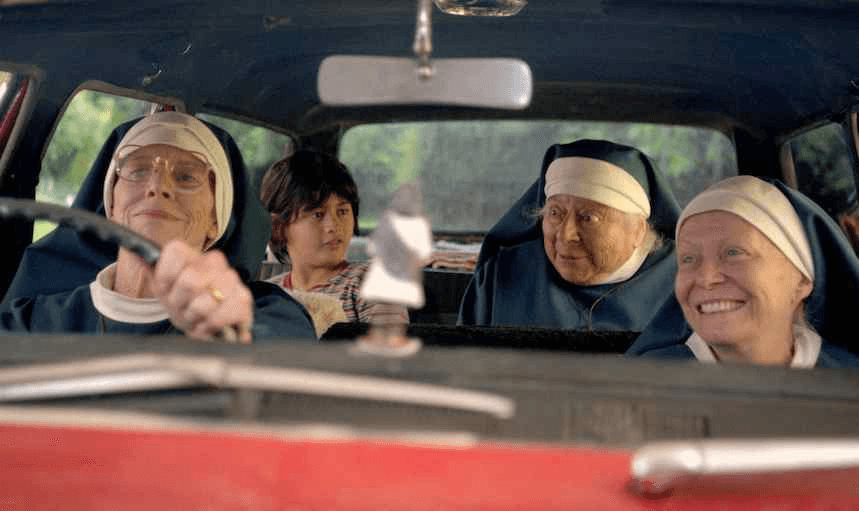Failed presenter Duncan Greive reviews the first episode of The Project, Three’s new 7pm current affairs show.
The lights came on and, after two weeks of as-live rehearsals, they really were speaking to the nation. Even for the show’s guest Rove McManus, who has spent most of his adult life on live television, it was a big moment. He’s the master franchise owner, and therefore as invested as anyone else at the shiny, semi-circular table in the show’s success.
In truth the first ten minutes were a shambles and a shemozzle, with Josh Thomson fumbling his first joke, and, in a botch that will go down in TV launch lore, the same serious story about a meth plague played twice, for an excruciatingly long time, before someone thought to throw back to the studio.
For all that, the debut of The Project NZ was also a quiet landmark. In between the events described above came news headlines – the f***in’ news! – which didn’t assume you’d just sat through an hour of the 6pm bulletins. It seems so simple, but it’s a massive change from the 7pm current affairs status quo.
The idea of the family which came home and ate their dinner off their knees while hanging on Tom Bradley and Angela D’Audney’s every word – that is history, folks. Everything from urbanisation, lengthened work hours and commute times and the changing distribution of work and home life between men and women has contributed to its breakdown.
So the assumption under which both Seven Sharp and Story were operating – that the audience was sick of hard news after an hour of it, and wanted something diverting – seems less likely to be true for younger people. Even the more real-time consumption of news as distributed by social media throughout the day doesn’t mean the audience doesn’t want to see it packaged together and put into some sort of hierarchy.
From the jump The Project NZ feels very different from what has gone before: more pacy and more urgent. But also more playful: “Kim Dotcom may be uploaded to the United States,” we’re told. The news contained writing, not just information transferral. That might take a while to stick and will probably lead to puns appearing in tragedy from time to time – but it also helps distinguish the product from what had immediately preceded it.
Along with the format, the show will live and die on the chemistry between its hosts. Jesse Mulligan is singing a redemption song after his extended torture on Seven Sharp, and the hours of live broadcasting he completes each week at Radio NZ helped him turn the potential disaster of the repeated meth story into a very good gag he called back to later in the piece.
Josh Thomson, early fumble aside, showed what a singular comedic talent he is, sitting for an eternity on “as you know I’m a big fan of chicken”, allowing the moment to go from funny, to weird and back again. How his style will go on harder news remains to be seen, but he’s one of the most naturally gifted performers in the country, so deserves some rope to figure that out.
The show’s emotional core is Kanoa Lloyd, likely the breakout star The Project NZ needs. She’s a generation down from Mulligan and Thomson, and even after a single episode, you saw flashes of how differently she’ll work with news. Her boycott of Cadbury was one thing, but it was the casual way she revealed her own father’s struggle with addiction and use of counselling, in a way which felt very natural rather than cynical, which most impressed. Amongst the quick cuts and onscreen graphics it was a moment of reflection which cut right through.
Two more were provided by the well-cast guests. Regular news rounds guy Ross Bell of the Drug Foundation only had a minute or so, but used it to knife Mark Richardson, who had brainlessly riffed a solution to meth addiction on The AM Show earlier in the day: “find the cook, take him out back and shoot him in the back of the head”. The Duterte approach, one which a certain kind of TV producer would no doubt applaud for being so provocative – but in this era, with the kind of leaders we have rising around the world, that joke just isn’t funny.
Michèle A’Court is, though. She was a sub in for Paula Bennett, who looks like she’s adding The Project to The Hui on her list of blacklisted shows. A’Court was interviewed about a Pharmac’s mulling of a potential tampon subsidy and delivered an electric couple of minutes, highlighted by what she’d buy with the money saved over a lifetime of not having to pay to have a period: “a 2010 Toyota Rav4” in bright red.
The episode was inevitably imperfect. The clips of game show contestants celebrating unconventionally and cooking show fails felt like a very literal approximation of a social media feed. And it was arguably too pacy: so much crammed in that there was no opportunity for the substantive conversation of which they’re no doubt capable. Yet by its close there was a sense of relief – a current affairs show that contained the day’s events, delivered with energy and humour and sometimes emotion. It felt like it was made by and for people under the age of 50 – which isn’t true of much television anymore, and is thus very, very welcome.
The Project airs weeknights on Three at 7pm



